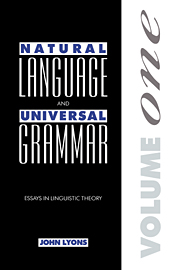Book contents
- Frontmatter
- Contents
- Preface
- Typographical conventions
- 1 Language, speech and writing
- 2 In defence of (so-called) autonomous linguistics
- 3 Linguistic theory and theoretical linguistics
- 4 Natural, non-natural and unnatural languages: English, Urdu and other abstractions
- 5 The origin of language, speech and languages
- 6 Phonemic and non-phonemic phonology: some typological reflections
- 7 Towards a ‘notional’ theory of the ‘parts of speech’
- 8 Deixis as the source of reference
- 9 Deixis and anaphora
- Appendix: The scientific study of language. Inaugural Lecture, Edinburgh, 1965
- Notes
- References
- Subject index
- Names index
5 - The origin of language, speech and languages
Published online by Cambridge University Press: 05 June 2012
- Frontmatter
- Contents
- Preface
- Typographical conventions
- 1 Language, speech and writing
- 2 In defence of (so-called) autonomous linguistics
- 3 Linguistic theory and theoretical linguistics
- 4 Natural, non-natural and unnatural languages: English, Urdu and other abstractions
- 5 The origin of language, speech and languages
- 6 Phonemic and non-phonemic phonology: some typological reflections
- 7 Towards a ‘notional’ theory of the ‘parts of speech’
- 8 Deixis as the source of reference
- 9 Deixis and anaphora
- Appendix: The scientific study of language. Inaugural Lecture, Edinburgh, 1965
- Notes
- References
- Subject index
- Names index
Summary
It is an interesting, and initially surprising, fact that at the very time when what was already coming to be known as Darwinism was being rapidly and enthusiastically adopted as the new scientific paradigm, the Linguistic Society of Paris, the most prestigious such learned society of the day, anathematized all speculation, whether Darwinian or not, about the origin of language. Since then, it has been traditional for philologists and linguists speaking or writing on this topic to begin by referring to this fact, apologetically or defiantly as the case may be, and by quoting the relevant statute of 1866: “The Society does not accept papers on either the origin of language or the invention of a universal language”. Why, it may be asked, did the founding fathers adopt such an apparently obscurantist attitude?
What may now be thought of as the standard view of linguists was expressed in typically forthright fashion by Whitney, whose words have frequently been quoted:
no theme in linguistic science is more often and voluminously treated than this, and by scholars of every grade and tendency; nor any, it may be added, with less profitable result in proportion to the labour expended; the greater part of what is said and written upon it is mere windy talk, the assertion of subjective views which commend themselves to no mind save the one that produces them, and which are apt to be offered with a confidence, and defended with a tenacity, that is in inverse ratio to their acceptableness. […]
- Type
- Chapter
- Information
- Natural Language and Universal GrammarEssays in Linguistic Theory, pp. 73 - 95Publisher: Cambridge University PressPrint publication year: 1991



